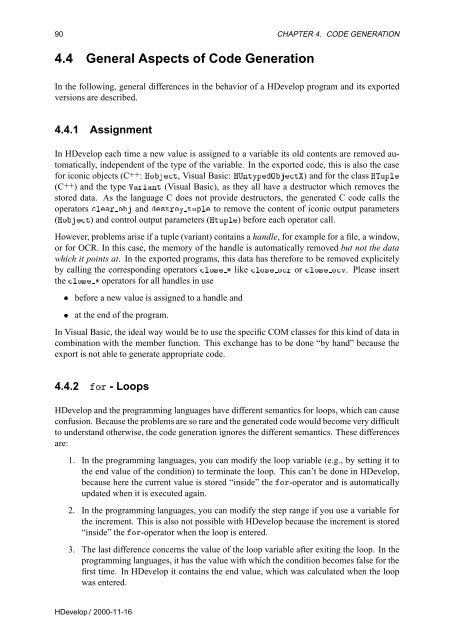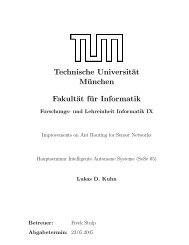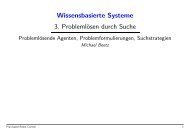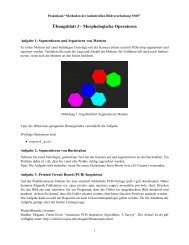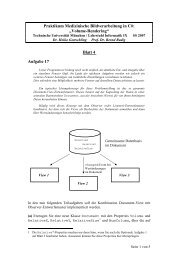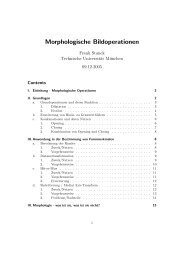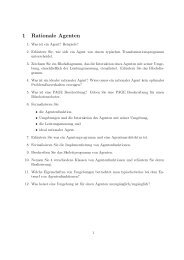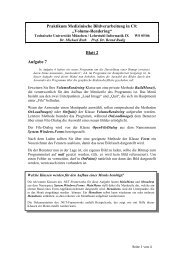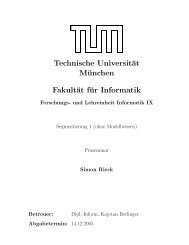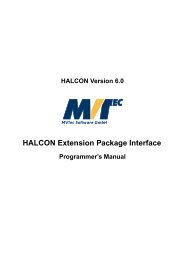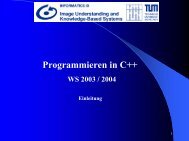You also want an ePaper? Increase the reach of your titles
YUMPU automatically turns print PDFs into web optimized ePapers that Google loves.
90 CHAPTER 4. CODE GENERATION<br />
4.4 General Aspects of Code Generation<br />
In the following, general differences in the behavior of a <strong>HDevelop</strong> program and its exported<br />
versions are described.<br />
4.4.1 Assignment<br />
In <strong>HDevelop</strong> each time a new value is assigned to a variable its old contents are removed automatically,<br />
independent of the type of the variable. In the exported code, this is also the case<br />
for iconic objects (C++: ÀÓØ, Visual Basic: ÀÍÒØÝÔÇØ) and for the class ÀÌÙÔÐ<br />
(C++) and the type ÎÖÒØ (Visual Basic), as they all have a destructor which removes the<br />
stored data. As the language C does not provide destructors, the generated C code calls the<br />
operators ÐÖ Ó and ×ØÖÓÝ ØÙÔÐ to remove the content of iconic output parameters<br />
(ÀÓØ) and control output parameters (ÀØÙÔÐ) before each operator call.<br />
However, problems arise if a tuple (variant) contains a handle, for example for a file, a window,<br />
or for OCR. In this case, the memory of the handle is automatically removed but not the data<br />
which it points at. In the exported programs, this data has therefore to be removed explicitely<br />
by calling the corresponding operators ÐÓ× like ÐÓ× ÓÖ or ÐÓ× ÓÚ. Please insert<br />
the ÐÓ× operators for all handles in use<br />
¯ before a new value is assigned to a handle and<br />
¯ at the end of the program.<br />
In Visual Basic, the ideal way would be to use the specific COM classes for this kind of data in<br />
combination with the member function. This exchange has to be done “by hand” because the<br />
export is not able to generate appropriate code.<br />
4.4.2 ÓÖ - Loops<br />
<strong>HDevelop</strong> and the programming languages have different semantics for loops, which can cause<br />
confusion. Because the problems are so rare and the generated code would become very difficult<br />
to understand otherwise, the code generation ignores the different semantics. These differences<br />
are:<br />
1. In the programming languages, you can modify the loop variable (e.g., by setting it to<br />
the end value of the condition) to terminate the loop. This can’t be done in <strong>HDevelop</strong>,<br />
because here the current value is stored “inside” the ÓÖ-operator and is automatically<br />
updated when it is executed again.<br />
2. In the programming languages, you can modify the step range if you use a variable for<br />
the increment. This is also not possible with <strong>HDevelop</strong> because the increment is stored<br />
“inside” the ÓÖ-operator when the loop is entered.<br />
3. The last difference concerns the value of the loop variable after exiting the loop. In the<br />
programming languages, it has the value with which the condition becomes false for the<br />
first time. In <strong>HDevelop</strong> it contains the end value, which was calculated when the loop<br />
was entered.<br />
<strong>HDevelop</strong> / 2000-11-16


